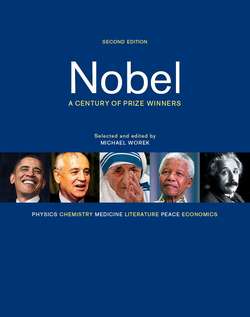Читать книгу Nobel - Michael Worek - Страница 21
На сайте Литреса книга снята с продажи.
ОглавлениеTheodore Roosevelt (1858–1919)
1906 Peace
For his intervention in the Russo-Japanese War at the Peace Conference in Portsmouth, New Hampshire.
Theodore Roosevelt was a controversial and important president, as well as a historian, biographer, hunter, naturalist and orator. He was as independent and remarkable as his nation. The descendent of a Dutch family who came to America in the 17th century, Roosevelt was born into a wealthy Manhattan home on October 27, 1858. His father was a merchant and philanthropist in New York City who, politically, was strongly Democratic until the mid 1850s, when he joined the Republican Party; during the Civil War he had been a noted supported of President Abraham Lincoln and the Union Army. Roosevelt’s mother was the daughter of an affluent, slave-holding family from the South and held Confederate sympathies.
Fragile and asthmatic but still known as mischievous and excitable, the young Theodore Roosevelt was educated by a private tutor in his youth. In 1876 he entered Harvard University and divided his time between books and sport. Although a dedicated student with a photographic memory, Roosevelt also became a fan of the cowboy and the adventurous lifestyle — what he referred to as the “strenuous life.”
Leaving Harvard Phi Beta Kappa and magna cum laude in 1880, he married Alice Hathaway Lee and took his first step into politics by joining the New York Republican Party. Four years later Roosevelt experienced a tragic year: a few hours after losing his mother, his wife died after giving birth to their only child, a daughter. Distraught, he sought refuge on his ranch in North Dakota, where he spent his time outdoors and writing. His The Naval War of 1812 became a classical history text for the next two generations. In 1886 Roosevelt was remarried in London to Edith Kermit Carow — a childhood friend with whom he would have five children — and returned to Oyster Bay, New York, and political activity.
He was director of the New York City Police Department from 1895 to 1897 and dramatically reformed the corrupt department. Roosevelt then served as Assistant Secretary of the Navy until 1898, when he enlisted in a regiment of cavalry volunteers known as the Rough Riders, which had been created to fight in the Spanish-American War. As a lieutenant colonel he fought in Cuba, showing great bravery, and he was posthumously awarded the Medal of Honor in 2001 for his actions in the Battle of San Juan Hill.
He also continued to dedicate himself to literature, and his most influential work was his four-volume history The Winning of the West (1889-1896), in which he explains on an evolutionary model how “the conquest and settlement by the whites of the Indian lands was necessary to the greatness of the race and to the well being of civilized mankind.” Although he believed in the superiority of his race, Roosevelt always insisted that jobs and education should be available to all without discrimination. Later works include An Autobiography (1913) and Rough Riders (1898).
Roosevelt was elected governor of New York at the end of 1898, and in 1900 he accepted the Republican nomination for vice president, helping William McKinley to an overwhelming victory. In September 1901 McKinley was assassinated and Roosevelt became president. At 42 years old he is the youngest person to become president in the history of the United States.
Roosevelt’s presidency from 1901 to 1909 (he was elected to a full term in 1904) was marked by a foreign policy based on the phrase “speak softly and carry a big stick,” which he first used during the 1901 Minnesota State Fair. He invested heavily in the navy to support an imperial strategy, defended the right of the United States to intervene in any conflict in the Americas and obtained American influence over the Panama Canal Zone in 1903. He would later criticize President Woodrow Wilson’s foreign policy as weak during World War I.
His mediation in the Russo-Japanese war, which ended in the signing of the Portsmouth Treaty, brought him the 1906 Nobel Peace Prize, the first American to be awarded the honor. At home Roosevelt fought against large industrial trusts, mediated in conflicts between companies and workers, pushed Congress to pass the Pure Food and Drug Act of 1906, reserved 194 million acres (over 785,000 sq. km) for national parks and nature preserves and began large irrigation projects.
Never loosing his interest in the so-called strenuous life, in 1909 Roosevelt left on an African safari that killed a total of 11,397 creatures, from insects to hippopotamuses and elephants, and he sent many specimens back to museums in Washington, DC. He also held numerous conferences with native and colonial leaders there. From 1913 to 1914 he was a member of a scientific expedition through South America that traced the 400-mile (644 km) River of Doubt, later renamed Rio Roosevelt, but he nearly died from malaria and other infections that would affect him until the end of his life.
While campaigning in Wisconsin in 1912, Roosevelt was shot in the chest by John Schrank, but the bullet first passed through his steel eyeglass case and a thick copy of his speech; he stoically finished while blood seeped through his shirt. Theodore Roosevelt died on January 6, 1919, after living out his belief that “Far better is it to dare mighty things, to win glorious triumphs even though checkered by failure than to take rank with those poor spirits who neither enjoy much nor suffer much because they live in the gray twilight that knows neither victory nor defeat.” He is commemorated alongside George Washington, Thomas Jefferson and Abraham Lincoln at the Mount Rushmore National Memorial in South Dakota.
